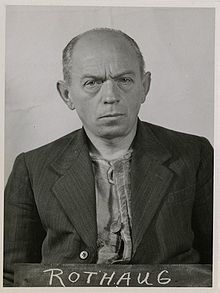Oswald Rothaug

Oswald Rothaug (born May 17, 1897 in Mittelinn ; † December 4, 1967 in Cologne ) was a German lawyer. The judge at the People's Court was sentenced to life imprisonment for crimes against humanity in the Nuremberg legal process in 1947 for his active participation in the Nazi regime of injustice .
Life
Rothaug, who grew up in Aura im Sinngrund and Aschaffenburg , was the son of an elementary school teacher and became the first public prosecutor in Nuremberg in June 1933 . After a time as a district judge in Schweinfurt , he became district court director and director of the special court in Nuremberg in April 1937 . Rothaug did not become a member of the NSDAP until 1938, but the beginning of his membership was dated back to May 1937. He worked on a voluntary basis in the security service of the Reichsführer SS (SD) and was an informant for them. In 1942 he sentenced a 25-year-old Polish slave laborer to death on the following grounds: "The defendant's entire inferiority in character is obviously due to his affiliation with Polish sub-humanity ".
One of his best-known judgments is the death sentence against the 68-year-old Jew Leo Katzenberger on March 14, 1942 for alleged " racial disgrace under the Blood Protection Act in connection with the ordinance against pests of the people ", despite the contrary statement by a witness that no intimate intercourse had taken place. The Nuremberg public prosecutor Hermann Markl , who had indicted Katzenberger, testified after the end of the war as a witness in the Nuremberg legal process against Rothaug.
In May 1943 Rothaug became a lawyer and thus prosecutor at the People's Court .
In the Nuremberg legal process on December 14, 1947, Rothaug was sentenced to life imprisonment for crimes against humanity . The sentence was later reduced to 20 years. On December 22, 1956, he was released from the Landsberg War Crimes Prison . Then he settled in Cologne-Mülheim and “got by with all kinds of work”.
Aftermath
The Katzenberger case, and thus Rothaug, became known to a broader public through the American film The Judgment of Nuremberg from 1961 and the German film Leo and Claire from 2001.
literature
- Ernst Klee : The dictionary of persons on the Third Reich . Who was what before and after 1945? S. Fischer, Frankfurt am Main 2003, ISBN 3-10-039309-0 .
Web links
- Klaus Kastner: "The murderer's dagger was hidden under the robe of the lawyer": The Nuremberg Jurists Trial 1947. (pdf; 143 kB) In: Juristische Arbeitsbätter. Luchterhand, Neuwied, 1997, pp. 699–706 (reproduced on justiz.bayern.de).
- Björn Kohlhepp: Nazi judge Oswald Rothaug: The executioner from the sense of reason. In: Main-Post . December 7, 2012 .
Individual evidence
- ↑ a b Ernst Klee: The dictionary of persons on the Third Reich. Who was what before and after 1945? 2nd updated edition, Fischer Taschenbuch Verlag, Frankfurt am Main 2005, ISBN 978-3-596-16048-8 , p. 510.
- ^ Quotation from Ernst Klee: Das Personenlexikon zum Third Reich. Fischer Paperback, 2005, p. 510.
- ↑ Justice / Rassenschande: So what. In: Der Spiegel 42/1967. October 9, 1967, pp. 87-89 , accessed May 17, 2019 .
| personal data | |
|---|---|
| SURNAME | Rothaug, Oswald |
| BRIEF DESCRIPTION | German lawyer |
| DATE OF BIRTH | May 17, 1897 |
| PLACE OF BIRTH | Middle sense |
| DATE OF DEATH | 4th December 1967 |
| Place of death | Cologne |